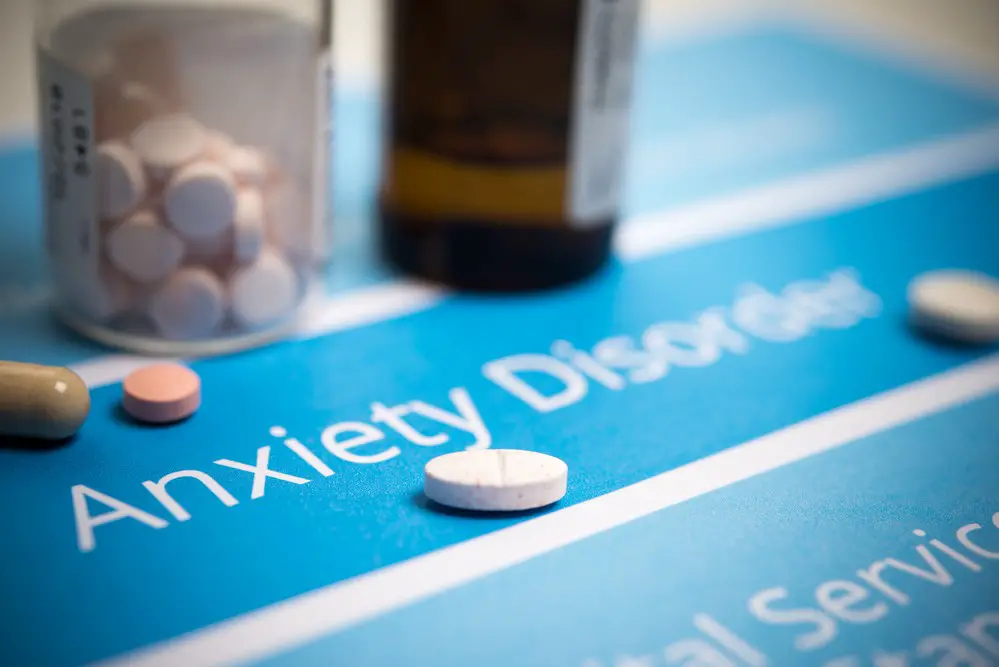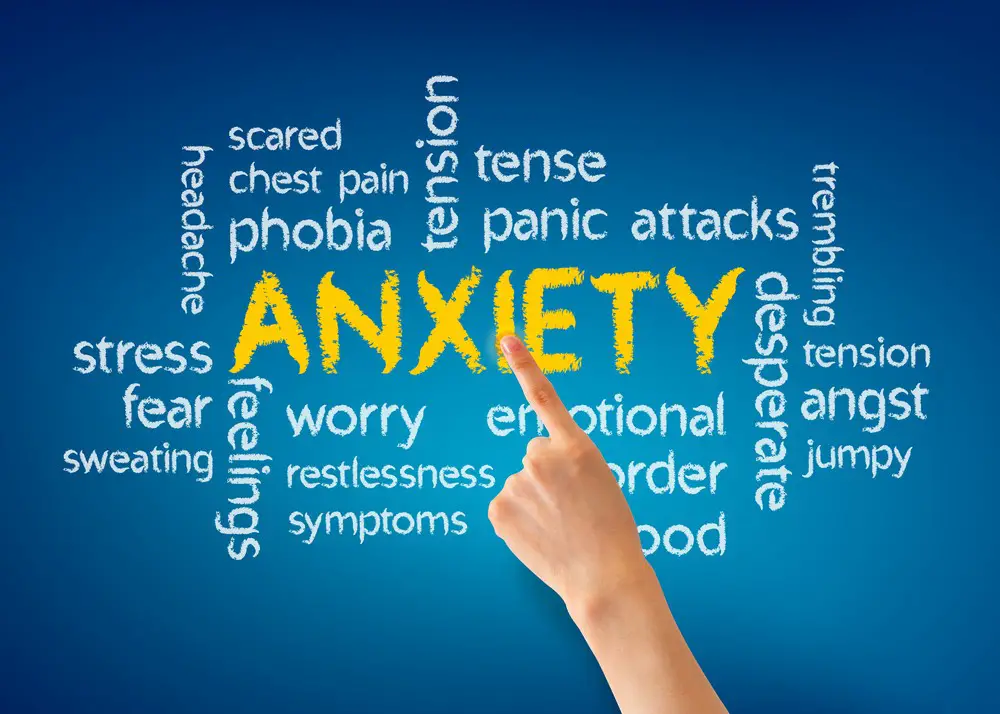As a BetterHelp affiliate, we receive compensation from BetterHelp if you purchase products or services through the links provided
Identifying the best time to take Lexapro for anxiety is crucial for individuals seeking relief from generalized anxiety disorder and other related conditions. Determining the right time to take Lexapro can drastically improve its effectiveness in treating anxiety and other mental health issues.
In this blog post, we’ll examine the advantages of taking Lexapro for anxiety and the potential side effects that may occur during treatment. We will also explore dosage considerations when starting Lexapro, including factors such as oral dosage forms and maximum recommended doses.
Furthermore, we’ll examine potential drug interactions with escitalopram oxalate (the generic form of Lexapro), how long it takes for this antidepressant medication to work, and strategies for managing anxiety without relying solely on medication. By grasping these treatment components, you can determine the optimal moment to take Lexapro for anxiousness and maximize its healing capacity.
Table of Contents:
- Identifying the Best Time to Take Lexapro for Anxiety
- Benefits of Taking Lexapro for Anxiety
- Side Effects of Taking Lexapro for Anxiety
- Dosage Considerations When Taking Lexapro for Anxiety
- Interactions Between Medications and Lexapro
- How Long Does It Take For Lexapro To Work?
- Strategies For Managing Anxiety Without Medication
- Tips for Maximizing the Effectiveness of Lexapro
- Frequently Asked Questions Best Time to Take Lexapro for Anxiety
- Conclusion
Identifying the Best Time to Take Lexapro for Anxiety

Understanding the best time to take Lexapro (Escitalopram) for anxiety can significantly impact how effectively it manages your symptoms. Generally, doctors suggest taking Lexapro once daily in the morning or evening; however, individual factors and preferences may influence the optimal time. However, finding the optimal time may vary depending on individual factors and preferences.
A) Morning vs. Evening: Factors to Consider
- Drowsiness: Some people experience drowsiness as a side effect of Lexapro. If this medication makes you sleepy during daytime hours, consider taking it in the evening before bedtime.
- Incorporating into a daily routine: Consistency is key when taking any medication; therefore, choose a time that fits well with your daily schedule and habits. This will make it easier to remember and maintain regularity.
- Anxiety patterns: If your anxiety tends to peak at specific times of day (e.g., mornings), discuss with your doctor whether adjusting your dosage timing could help alleviate these heightened periods of distress.
B) Monitoring Your Response & Adjusting Accordingly
Paying close attention to how you feel after starting Lexapro can provide valuable insights into determining its ideal timing for you. Keep track of any changes in mood or side effects throughout different times of day – this information can be helpful when discussing adjustments with your healthcare provider. If needed, don’t hesitate to experiment by switching between morning and evening doses until you identify what works best for you. Remind yourself to check with your physician before making any alterations, and allow enough time for adaptation, as the medication’s effects may differ during the initial phases of therapy.
C) Communicating with Your Healthcare Provider
Always communicate openly with your healthcare provider when determining the best time to take Lexapro for anxiety. They can offer personalized advice based on your medical history, symptoms, and other medications you may be taking. In addition, they will monitor your progress throughout treatment and make necessary adjustments to ensure optimal results while minimizing side effects.
It is essential to identify the best time to take Lexapro for anxiety to maximize its effectiveness and reduce any potential side effects. Investigating the advantages of Lexapro may assist in forming a knowledgeable judgment concerning its use for personal psychological well-being.
Benefits of Taking Lexapro for Anxiety

Taking Lexapro for anxiety can offer numerous benefits that help improve your overall mental health and well-being. This medication, also known as escitalopram, is a selective serotonin reuptake inhibitor (SSRI) commonly prescribed to treat various anxiety disorders such as generalized anxiety disorder (GAD), panic disorder, and social anxiety disorder.
A. Improved Mood and Emotional Stability
Lexapro can help raise the serotonin amounts in the brain, a neurotransmitter responsible for controlling moods, sleep patterns, and other essential body processes. Neurotransmitter serotonin is accountable for managing emotions, hunger, sleep cycles, and other essential body processes. By increasing serotonin levels, Lexapro helps stabilize emotions and reduce feelings of sadness or irritability often associated with anxiety disorders.
B. Reduced Stress Levels
Anxiety often increases stress levels, negatively impacting physical and mental health if left untreated. Through its action on serotonin receptors in the brain, Lexapro has been shown to effectively reduce stress levels, allowing individuals suffering from anxiety disorders to cope better with daily challenges.
C. Enhanced Cognitive Functioning
In addition to improving mood stability and reducing stress levels, research suggests SSRIs like Lexapro may positively affect cognitive functioning in people with anxiety disorders by enhancing memory recall abilities under stressful conditions (source). This improvement in cognitive function could further contribute to an individual’s overall quality of life when dealing with chronic anxiety.
D. Improved Sleep Quality
Many people with anxiety disorders struggle with sleep disturbances, such as insomnia or restless sleep. Lexapro has been shown to improve sleep quality in individuals suffering from anxiety by helping them fall asleep faster and stay asleep longer throughout the night.
E. Increased Social Functioning
Fear and unease can make socializing difficult, resulting in feelings of seclusion. By reducing anxiety symptoms, Lexapro can facilitate excellent social functioning and improved quality of life for those with anxiety disorders.
In summary, taking Lexapro for anxiety offers several benefits that contribute to improved mental health and well-being. Speaking with your healthcare provider before beginning any new medication regimen is essential, as they can provide guidance tailored to your individual needs and medical history.
Taking Lexapro for anxiety can provide many benefits, such as improved mood and reduced stress levels. Despite its potential benefits, it is essential to be cognizant of the possible adverse effects before beginning a Lexapro regimen for anxiety.
Side Effects of Taking Lexapro for Anxiety

Taking Lexapro, a selective serotonin reuptake inhibitor (SSRI), can effectively treat generalized anxiety disorder and other mental health issues. However, it’s essential to be aware of the potential side effects associated with this antidepressant medication. Understanding these common side effects, you can better manage them and communicate any concerns with your doctor.
Possible Side Effects of Lexapro
- Drowsiness: One common side effect is drowsiness or fatigue when starting Lexapro. This may improve over time as your body adjusts to the medication.
- Nausea: Some people experience nausea while taking escitalopram oxalate, which usually subsides after a few days or weeks on the drug.
- Inability to stay asleep: Insomnia or difficulty staying asleep might occur during the initial stages of treatment but typically improves over time.
- Serotonin syndrome: Although rare, there is a risk of developing serotonin syndrome – a potentially life-threatening condition caused by excessive levels of serotonin in the body – especially if taken alongside monoamine oxidase inhibitors (MAOIs) or other medications that increase serotonin levels. If you suspect any symptoms of serotonin syndrome, such as agitation, confusion, rapid heart rate, high blood pressure, or muscle rigidity, contact your doctor immediately for proper medical attention. Learn more about Serotonin Syndrome here.
Tips for Managing Side Effects
If you’re experiencing side effects from taking Lexapro, consider the following tips to help manage them:
- Start with a lower dose: Your doctor may initially prescribe a lower dose of escitalopram oxalate to minimize side effects. Gradually increasing the dosage can also help your body adjust.
- Maintain a regular dosing schedule: Taking Lexapro simultaneously daily can help regulate serotonin levels and reduce side effects.
- Communicate with your doctor: Discussing these concerns with your healthcare provider is crucial if you’re experiencing severe or persistent side effects. They may recommend adjusting your dosage or trying an alternative medication.
Please note that this is not an exhaustive list of potential side effects associated with Lexapro. Always consult your doctor for personalized advice regarding any symptoms you experience while taking this medication. Visit our section on Techniques for Coping with Anxiety and Depression without Meds to learn more.
Before deciding on treatment with Lexapro for anxiety, it is essential to be aware of any possible side effects. Next, we will discuss dosage considerations when taking Lexapro for anxiety.
Dosage Considerations When Taking Lexapro for Anxiety
It is essential to collaborate with your healthcare professional when deciding the suitable dose according to your personal requirements and medical history for Lexapro’s efficacy against anxiety to be maximized while minimizing potential adverse effects. Working closely with your healthcare provider to determine the appropriate dosage based on your needs and medical history is essential.
A. Starting Dosage
At the outset, physicians usually prescribe a minimal dosage of Lexapro (10 mg daily) to reduce potential initial adverse effects and give your body time to acclimate before raising the dose if necessary. This allows your body time to adjust to the medication before increasing the dosage if necessary.
B. Gradual Increase in Dosage
Suppose you don’t experience significant improvement in your anxiety symptoms after a few weeks or continue experiencing bothersome side effects. In that case, your doctor may recommend gradually increasing the dosage by 5-10 mg weekly until an effective therapeutic level is reached.
C. Maximum Recommended Dosage
The maximum recommended daily dose of Lexapro for adults with a generalized anxiety disorder (GAD) is 20 mg per day, according to Mayo Clinic guidelines. However, it’s essential not to exceed this limit without consulting your healthcare provider first, as higher doses can increase the risk of adverse reactions.
D. Individual Factors Affecting Dosage Needs
- Age: Older adults may require lower dosages due to age-related changes in metabolism and increased sensitivity toward medications’ side effects.
- Kidney or liver function: People with impaired kidney or liver function may need a lower dosage, as these organs play a significant role in metabolizing and eliminating Lexapro from the body.
- Other medications: If you’re taking other medications that interact with Lexapro, your doctor may adjust your dosage to prevent potential complications. Ensure to inform them of all prescription and over-the-counter drugs you currently use.
In conclusion, it’s essential to work closely with your healthcare provider when determining the correct dosage of Lexapro for anxiety management. Regularly monitor your symptoms and side effects while on this medication so that any necessary adjustments can be made promptly.
It is essential to consider the dosage of Lexapro when treating anxiety, as it can significantly impact symptom relief. It is imperative to comprehend how other drugs may affect Lexapro and what safety measures should be taken when utilizing this medication.
Interactions Between Medications and Lexapro
Taking multiple medications can sometimes lead to interactions that may affect the efficacy of each drug or cause adverse reactions. When taking Lexapro for anxiety, it is crucial to be aware of potential medication interactions to avoid complications and ensure effective treatment. This section will discuss some common medications that may interact with Lexapro.
A. Antidepressants and Serotonin Syndrome
Combining Lexapro with other antidepressants, particularly those belonging to the same class (selective serotonin reuptake inhibitors or SSRIs) or another class called serotonin-norepinephrine reuptake inhibitors (SNRIs), could increase your risk of developing a rare but severe condition known as serotonin syndrome. This occurs when there is excessive serotonin in the body, leading to symptoms such as agitation, confusion, rapid heart rate, high blood pressure, muscle rigidity, and seizures.
B. Blood Thinners and Increased Bleeding Risk
Take blood thinners like warfarin or aspirin alongside Lexapro for anxiety management. You should know that these combinations might increase your risk of bleeding complications due to their synergistic effects on the inhibition of platelet function, which helps prevent clot formation within blood vessels. Consult your healthcare provider before starting any new medications while on Lexapro therapy.
C. MAO Inhibitors: A Dangerous Combination
Mixing MAOIs with Lexapro can be fatal, so it is imperative to wait 14 days after ceasing an MAOI before beginning treatment with Lexapro. This combination could result in excessive serotonin, which can cause severe repercussions and even be fatal. It is essential to wait at least 14 days after stopping an MAOI before starting Lexapro treatment.
D. Over-the-Counter Medications and Supplements
NSAIDs like ibuprofen or naproxen can increase bleeding risk when taken with Lexapro, so caution should be exercised. Additionally, St. John’s Wort – a popular herbal supplement for mood support – has been known to interact negatively with SSRIs like Lexapro by increasing the risk of serotonin syndrome.
In conclusion, it is crucial to inform your healthcare provider about all medications you are currently taking or planning on taking while being treated with Lexapro for anxiety management purposes. They can help monitor potential interactions closely and adjust dosages accordingly if needed.
It is critical to be cognizant of any possible interactions between medications and Lexapro, as this could affect treatment efficacy. Realizing the duration required for Lexapro to take effect is critical to gain maximum benefit.
How Long Does It Take For Lexapro To Work?
If you’re starting to take Lexapro for anxiety, it’s natural to wonder how long it will take before you begin experiencing relief from your symptoms. The timeframe for Lexapro to take effect can differ based on the individual and their situation. However, some general guidelines can help give you an idea of what to expect.
Average Time Frame
On average, most people start noticing improvements in their anxiety symptoms within 1-4 weeks after beginning treatment with Lexapro. This is because the medication needs time to build up in your system and affect serotonin levels in your brain, which play a crucial role in regulating mood and anxiety.
Tips for Monitoring Progress
To determine if Lexapro is working effectively for you, consider tracking the following signs:
- Mood improvement: Pay attention to any changes in your overall mood or emotional state, which may indicate that the medication is starting to work.
- Anxiety reduction: Keep track of any decreases in worry or nervousness throughout each day.
- Sleep quality: As anxiety often affects sleep patterns, note whether you experience better sleep while taking Lexapro.
- Coping skills: Observe if coping with daily stressors becomes easier over time, as this could be another sign that the medication is effective.
Patient Factors Affecting Response Time
Remember that several factors can influence how quickly an individual responds to Lexapro treatment. These include age, metabolism rate, genetic makeup, the severity of symptoms, and other medications being taken concurrently. If you’re concerned about the time it’s taking for Lexapro to work, consult your healthcare provider. They can help determine if any adjustments need to be made or suggest alternative treatment options.
It’s important to remember that patience is vital when starting a new medication like Lexapro. It may take some time to notice significant improvements in your anxiety symptoms. In the meantime, consider incorporating anxiety management techniques into your daily routine and maintain open communication with your healthcare provider regarding any concerns or questions.
Lexapro may be a viable solution for managing anxiety, though it can take some time before one notices any positive changes. For those seeking alternative strategies, the following heading will discuss managing anxiety without using medications.
Strategies For Managing Anxiety Without Medication

If you’re looking for ways to manage your anxiety without relying on medication, several strategies can help. These techniques can be used with Lexapro or as standalone methods for coping with anxiety.
A. Mindfulness and Meditation
Mindfulness and meditation have been proven to reduce stress and anxiety by promoting relaxation and self-awareness. By focusing on the present moment, you can learn to let go of negative thoughts and emotions contributing to your anxiety.
B. Exercise Regularly
Engaging in regular physical activity is another effective way to manage anxiety naturally. Exercise has been shown to release endorphins, which improve mood and decrease stress levels.
- Aerobic exercises like jogging, swimming, or cycling are particularly beneficial for reducing anxiety symptoms.
- Moderate-intensity exercise should be performed at least 30 minutes daily, five days a week, for optimal results.
- Incorporate strength training exercises into your routine twice weekly for additional benefits.
C. Establish a Healthy Sleep Routine
Poor sleep quality often exacerbates feelings of anxiety; therefore, it’s essential to establish a healthy sleep routine by:
- Maintaining consistent bedtimes and wake-up times every day (including weekends).
- Creating a relaxing bedtime environment free of distractions.
- Avoiding caffeine and alcohol close to bedtime.
For more tips on improving your sleep, check out this guide on sleep hygiene.
D. Seek Professional Help
If your attempts to cope with anxiety have been unsuccessful, it’s essential to consult a specialist in anxiety disorders for assistance and personalized guidance. They can provide guidance and support tailored to your specific needs. You can find resources for locating mental health professionals through the National Institute of Mental Health (NIMH).
E. Utilize Support Groups and Online Communities
Connecting with others who share similar experiences can be incredibly helpful when managing anxiety without medication. Consider joining local support groups or online communities where you can discuss your feelings, learn coping techniques, and gain encouragement from others facing similar challenges.
Incorporating these strategies into your daily routine may help reduce reliance on medications like Lexapro while effectively managing anxiety symptoms.
Managing anxiety without medication can be a challenging but rewarding journey. By understanding the best time to take Lexapro for anxiety, you will have an additional tool in your arsenal for managing this condition.
Tips for Maximizing the Effectiveness of Lexapro
In this section, we will discuss some tips and strategies to help you maximize the effectiveness of Lexapro in managing your anxiety symptoms. Following these suggestions can lead to better results and a more positive experience with this medication.
8.1 Establish a Consistent Routine
One key factor in maximizing the benefits of Lexapro is establishing a consistent routine when taking it. This means taking it simultaneously every day, which helps maintain stable levels of the drug in your system. A consistent routine also makes it easier to remember your daily dose, reducing any missed doses or irregularities that could impact its effectiveness.
8.2 Communicate With Your Healthcare Provider
Maintaining open communication with your healthcare provider is essential while using Lexapro for anxiety management. Regularly updating them on how you’re feeling and any side effects you may be experiencing allows them to adjust your dosage if necessary or recommend additional treatments that might complement Lexapro’s effects (source).
8.3 Incorporate Therapy Alongside Medication Use
CBT has been demonstrated to be highly successful in treating anxiety alongside medications like Lexapro, and it teaches coping skills for managing negative thought patterns contributing to the disorder. CBT helps individuals identify negative thought patterns contributing to their anxiety and teaches coping skills for managing those thoughts effectively.
- Talk therapy: Working with a therapist can help you explore the root causes of your anxiety and develop strategies to manage it more effectively.
- Group therapy: Joining a support group can provide an opportunity to connect with others experiencing similar challenges, share experiences, and learn from one another.
8.4 Implement Lifestyle Changes
In addition to taking Lexapro for anxiety management, implementing specific lifestyle changes can help improve your overall mental health. Some examples include:
- Maintaining a healthy diet: Consuming a balanced diet rich in fruits, vegetables, whole grains, lean proteins, and healthy fats is essential for optimal brain function and emotional well-being.
- Regular exercise: Regular physical activity has been shown to reduce anxiety symptoms by releasing endorphins that boost mood and promote relaxation.
- Sleep hygiene: Prioritizing good sleep habits such as maintaining consistent bedtimes/wake times, creating a relaxing bedtime routine (e.g., reading or meditation), and avoiding caffeine close to bedtime can help improve sleep quality which plays a vital role in managing anxiety symptoms.
Click Here To Save 10% On Your First Month
Frequently Asked Questions

When is the best time to take Lexapro for anxiety?
The best time to take Lexapro for anxiety is typically in the morning or evening, depending on individual preferences and the side effects experienced. It’s essential to maintain a consistent schedule when taking this medication. Consult your healthcare provider for personalized advice.
What are the advantages of taking Lexapro at night?
Taking Lexapro at night may help minimize daytime drowsiness, a common side effect. Additionally, it allows the medication to work overnight while you sleep, potentially relieving anxiety symptoms upon waking up.
Can Lexapro help with anxiety immediately?
Lexapro does not provide immediate relief from anxiety; it usually takes 1-4 weeks before noticeable improvements occur. However, some individuals may experience subtle changes within days of starting treatment. Patience and consistency are essential when using this medication.
Does Lexapro work better at night?
There isn’t enough evidence to suggest that Lexapro works better at night than at other times of the day. The effectiveness depends on individual factors such as metabolism and symptom severity rather than timing alone. Choose a consistent time based on personal preference and potential side effects.
Conclusion
Finding the best time to take Lexapro for anxiety can be a challenge. Consult your physician and consider all relevant elements, such as dose, drug-drug interactions, pros/cons of the medication, and more, when attempting to determine an optimal time for taking Lexapro for anxiety. Taking some time to explore strategies for managing anxiety without medication may also be beneficial in helping you find the right balance of treatments that work best for you.
Take control of your anxiety today by learning the best time to take Lexapro. Our advice site will provide you with all the necessary information and resources for success.
- 7 Ideas to Help You Relax and Unwind on a Family Vacation - April 27, 2025
- How Having Cybersecurity Protection Helps You Relax - April 25, 2025
- 8 Reasons Why Spending Time Outside Calms You Down - April 25, 2025
This site contains affiliate links to products. We will receive a commission for purchases made through these links.




